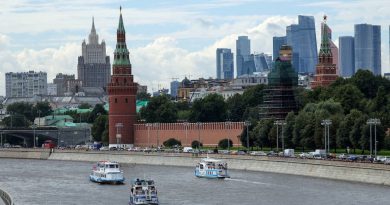EU may ban trade in Russian state bonds, sanction hundreds of people
Brussels (Reuters) – European Union sanctions on Russia could include putting hundreds of politicians and officials on black lists, a ban on trading in Russian state bonds and an import and export ban on separatist entities, EU diplomats and officials said on Tuesday.
The bloc’s ambassadors agreed unanimously at a meeting in Brussels on the principle of imposing sanctions after Russia formally recognised two breakaway regions in eastern Ukraine.
EU foreign ministers will meet later in Paris to agree on the details of the measures, several diplomats told Reuters.
Meanwhile, German Chancellor Olaf Scholz put certification of the Nord Stream 2 gas pipeline on ice, in one of the most far-reaching reactions to Moscow’s moves.
Russian President Vladimir Putin’s announcement on Monday, followed by his signing a decree on the deployment of Russian troops to Donetsk and Luhansk, drew international condemnation and immediate U.S. sanctions.
The EU has repeatedly said it was ready to impose “massive consequences” on Russia’s economy if Moscow invades Ukraine but has also cautioned that, given the EU’s close energy and trade ties to Russia, it wants to ratchet up sanctions in stages.
“We’ve got to ensure that whatever happens, Russia will feel the pain … to make sure Russia has absolutely no incentive to go further,” Irish EU affairs minister Thomas Byrne said earlier on Tuesday.
The package of sanctions could include putting on an EU blacklist those members of the lower house of Russia’s parliament that voted in favour of recognising the independence of the two breakaway regions, one EU official said.
The ambassadors also discussed sanctioning companies and banks involved in financing separatist activities in eastern Ukraine, a European Commission source said.
The two regions could also be removed from a free trade deal between the EU and Ukraine, the source added.
Not all of the bloc’s 27 member states have the same relation to Russia or dependency on its gas, which could eventually complicate the adoption of sanctions.
EU officials and diplomats said some EU countries, including Austria, Hungary and Italy, Russia’s closest allies in the bloc, would prefer more limited sanctions in response to Putin’s move on eastern Ukraine.
Others want to see a fuller, tougher range of measures discussed in recent weeks for the event of a Russian invasion of Ukraine to be rolled out now. Baltic, central and eastern European states say tough sanctions should be imposed immediately as Russia is already showing military aggression towards Ukraine.
Italian Prime Minister Mario Draghi, whose country relies on Russian for much of its gas, told a news conference in Rome that any sanctions should not include energy imports. read more
“How we react as European Union will define our character and indeed the future of Europe,” Lithuanian vice minister of foreign affairs Arnoldas Pranckevicius said at a meeting in Brussels.
The sanctions “should not be symbolic. If we want to deter further actions from president Putin, if we want to stop the war from happening, we need to move ahead with serious measures.”


